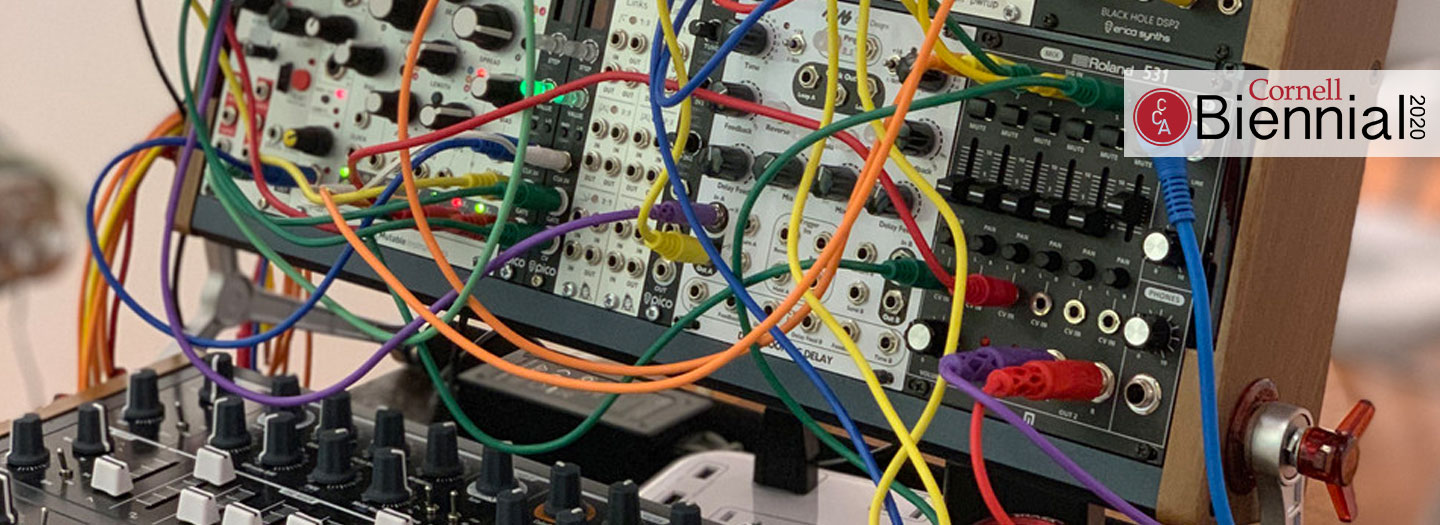
J. ROBERT LENNON
Stigmergium
The idea of the swarm is highly applicable to the music we make, and this project will lean heavily into the concept, exploring it via synthetic sound-generation techniques that mimic nature, and natural sounds processed and repurposed through electronic means. Stigmergy is the concept of indirect coordination between agents in a system; even when each agent is unaware how or why another is acting, every agent’s actions influence the others. Our mode of composition and performance mimics this natural phenomenon; though we have a common goal and a shared musical framework, our performances are semi-improvised, based upon our reactions to one another’s work. For our Biennial recording and performance, we will employ site-specific sound samples, including natural sounds recorded at or near the performance space, and other Cornell for instance, the Natural Sounds Collection of insect and bird sounds archived at the Cornell Lab of Ornithology.
Our music relates to the Swarm theme in several ways. Many synthesized sounds are created through loosely interacting sound waves. Multiple analog oscillators, as a result of their natural instability, render a rich, dimensional sound when played in unison. In Frequency Modulation and Phase Distortion digital synthesis, the frequency of waveforms is modulated by other waveforms. Analog and digital synthesis may be used to mimic natural sounds, but they are also, and perhaps more productively, employed to create a nuanced and organic fiction, a kind of electronic natural sonic world.
We intend to use our sounds in both ways: we will use the site-specific and archived natural sounds as reference materials for new sounds that we generate electronically. But we will also use our field recordings in the work itself, processing and altering them in performance. In this way, we will engage in two simultaneous dialogues: each musician in conversation with the others, and the group of musicians collectively in conversation with the environment.
Finally, we’re interested in semirandomness and pseudorandomness, and the imposition of artificial intelligence on a composed framework. Jim’s digital synthesizers take the form of software applications; John’s modular synthesizer employs several different algorithmic pattern generators and explores interconnectedness and extemporaneity; and Trevor’s analog synthesizers embrace the instability and unpredictability of vintage electronic equipment. Our “Stigmergium” will be a long-form recording and performance; we’ll use the grant in part to explore new synthesis methods and to gather sounds, and in part to record, manufacture, and distribute a CD of original music to be distributed to eventgoers. Our recording and performance will match in intent and style, but differ in specifics; as with natural events, no two performances of the material will ever be the same.
J. Robert Lennon (US)
J. Robert Lennon is the author of two story collections, Pieces For The Left Hand and See You in Paradise, and eight novels, including Familiar and Broken River. He holds an MFA from the University of Montana, and has published short fiction in The New Yorker, Harper’s, Playboy, Granta, The Paris Review, Electric Literature, and elsewhere. He has been anthologized in Best American Short Stories, Best American Nonrequired Reading, and Prize Stories: The O. Henry Awards, and he co-hosts the podcast Lunch Box, with poet Ed Skoog. His book reviews have appeared in The New York Times Book Review, The Guardian, The Globe and Mail, and The London Review of Books.